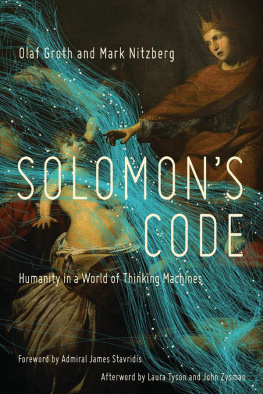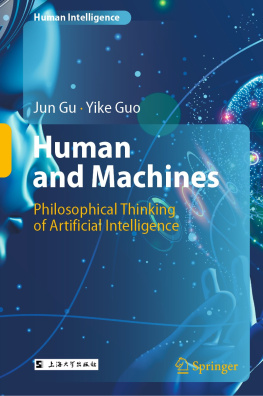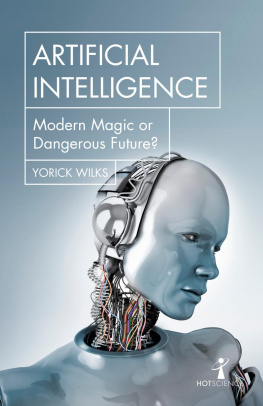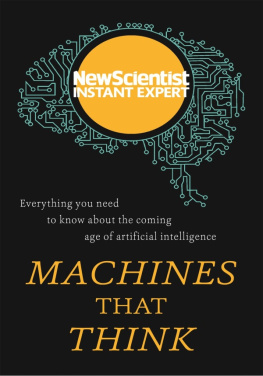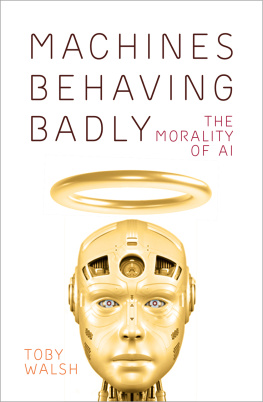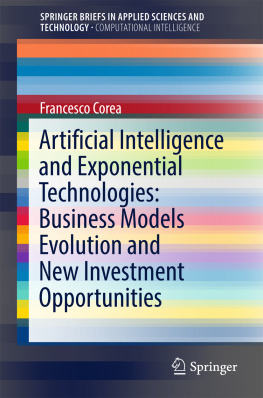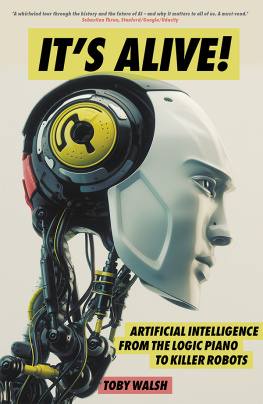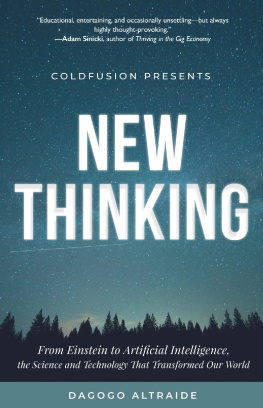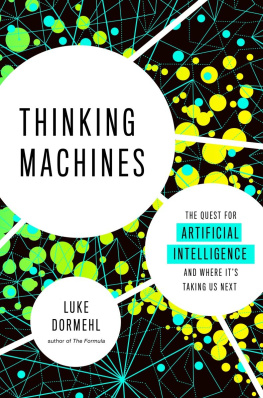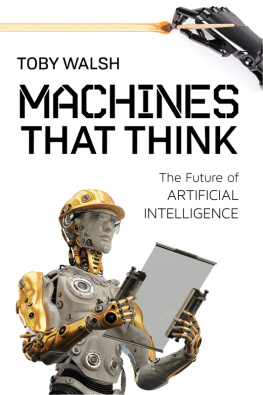Contents
Guide

SOLOMONS CODE
Humanity in a World of Thinking Machines
OLAF GROTH
and MARK NITZBERG
WITH DAN ZEHR

SOLOMONS CODE
Pegasus Books Ltd.
148 W. 37th Street, 13th Floor
New York, NY 10018
Copyright 2018 Olaf Groth and Mark Nitzberg
First Pegasus Books edition November 2018
Interior design by Maria Fernandez
All rights reserved. No part of this book may be reproduced in whole or in part without written permission from the publisher, except by reviewers who may quote brief excerpts in connection with a review in a newspaper, magazine, or electronic publication; nor may any part of this book be reproduced, stored in a retrieval system, or transmitted in any form or by any means electronic, mechanical, photocopying, recording, or other, without written permission from the publisher.
Library of Congress Cataloging-in-Publication Data is available.
ISBN: 978-1-68177-870-9
ISBN: 978-1-68177-935-5 (ebk.)
Distributed by W. W. Norton & Company, Inc.
www.pegasusbooks.us
To our children, Hannah & Fiona Groth-Reidy and Henry & Cecily Nitzberg:
may the era of thinking machines empower your humanity.
CONTENTS
by Admiral James G. Stavridis
S ince graduating from the US Naval Academy, I have spent forty years in public service, analyzing opportunities and threats and leading large-scale efforts that seize the former and mitigate the latter. I consider myself fortunate to have served with many formidable colleagues in US and allied administrations as we navigated through the Cold War, the rising threat of terrorism in its aftermath, and the accelerating changes across the geo-political and geo-economic landscape in the years since. Turbocharged now by digital technologies, this constant process of global transformation has both enabled and threatened peace and prosperity across borders. We have seen technology facilitate a number of key shifts throughout recent historyfrom a bipolar to a multipolar global order surfacing myriad new actors; from an analog to digital economy yielding unrivaled degrees of connectivity and anonymity; from technology for the elites to technology for the masses enabling entirely new ways of educating and participating; and from physical labor to knowledge workers leading to new distributions in the economics of working and earning.
We now are living amidst a fifth seismic shift, moving from purely linear computing systems to more cognitive and human-like technologies. The application of neural networks and machine learning techniques has given computer systems the ability to learn with minimal supervision, recognize complex patterns, and make recommendations and decisions on our behalf. Some of these decisions are small, subtle, and merely convenient to our everyday lives; others will have major impacts on people around the world. The application of both types is increasing rapidly and driven often in stealth fashion, by both commercial and political actors, most of whom hold honorable intentions and want to make this world a better place. To a great extent, we do get a better world. But even so, far-reaching ripple effects and unintended consequences make these advanced cognitive technologies both a panacea and a Pandoras box.
As a Strike Group Commander more than a decade ago, I oversaw the use of remotely piloted aircrafts to conduct strikes throughout Iraq, Afghanistan, and the Horn of Africa. These systems were highly effective and reduced the odds of collateral damage. A few years later, as a four-star Admiral and NATO Commander, we used the same technologies extensively in Libya. That 2011 campaign recorded the lowest number of collateral damage issues of any major air battle in history. But in every one of those operations we kept a man or woman in the loop. It was obvious to me at the time that, sooner or later, we would have to grapple with the crucial issues that emerge if or when we decide to take a human out of the loop. The technical, ethical, and moral issues involved are essential, and the debate that is now emerging has been a long time in the making.
Similar crucial discussions are unfolding around a wide range of AI-powered technologies, and we all need to engage in these deliberations. As these thinking machines analyze knowledge and synthesize new insights and wisdom, they become powerful command-and-control instruments in the hands of those who understand them. Those who dont understand these cognitive systems will face a decisive disadvantage, and that imbalance of power illustrates the dark side of this rapidly expanding field. But we must remember that power also lies in the ability of burgeoning AI models to synthesize various data streams and develop workable solutions for wickedly complex problems. Our remarkable human ability to develop technologies that augment the limitations of the human brain and all our human foibles is the bright side of this new cognitive era.
Consider, for example, the complex problem humanity faces in conserving natural resources and preventing climate change. Think about ways we might provide more equitable health care in the United States, where we all too often dismiss the problem as a zero-sum contest between dollars and benefits, regularly overlooking more holistic ways we could lead healthier lives. And what about diversity and productivity at worka balancing act that seems so difficult we devolve into endless stereotyping and alienation? The sheer complexity of all these major challenges can overwhelm us, and we too often default to reductionist thinking to find quick and easy answers.
In our lives and careers, all of us must deal with the types of difficult problems that stretch our brains to their limits or beyond. My career brought the same, whether in my role as a destroyer captain, the supreme commander at the helm of NATO forces in Europe, the dean of one of the worlds premier international leadership academies, or in my everyday life as a father and a husband. But what drives success is our ability, as adaptable and malleable human beings, to convert these challenges into new horizons for personal and societal growth. Here, the ability of artificial intelligence and cognitive computing systems to help us make decisions could provide vast benefits.
Imagine a sophisticated AI-driven system that could diagnose where the worlds next food crisis will occur and then recalibrate the global supply chain to solve the bottlenecks preemptively. It turns out were already working on exactly that. Envision AI-powered mental-health interventions that could sharply reduce suicide rates among the mentally ill. There are smart people working on that, too. We are already creating new technologies that help illiterate people partake in the economy through computer vision technologies. Developers have created ways to teach children languages, math, and other subjects in ways that are more fun, more individualized to their needs, and more effective. Some researchers are creating innovative ways to help employers motivate their employees by making their work more meaningful and providing them a deeper sense of purpose. Others are beating cyber terrorists at their game, using cognitive computing systems to predict attack patterns and react far faster to breaches that do occur.
These developments inspire me, but as someone who spent decades protecting and leading people, I know that power and trust can be abused if guided by the wrong values. One must navigate through dark places before reaching the light. Thats why we need to shape the design and application of these cognitive technologies so they serve all humankind, rather than just the powerful and wealthy. Ensuring those beneficial ends, harnessing their potential and circumventing their destructive power relies on our ability to once again muster the worlds talent and create a coordinated global effort. I encourage you to engage and become part of that formative endeavor.

